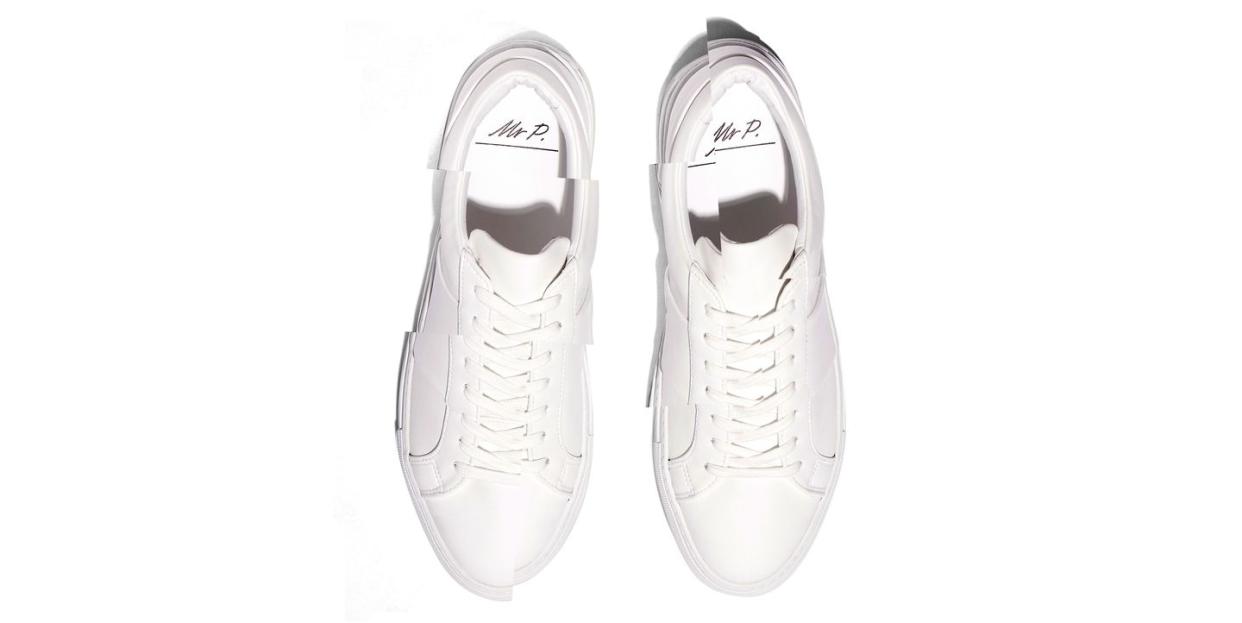Forget Leather, Mr P.'s High-End White Sneakers Are Made From Grapes

SHOP $335, mrporter.com
Welcome to The Investment, a regular column highlighting those pieces—a little pricier, a lot nicer, and entirely worth the money—that we can't help but advocate for you owning. These are the things our editors love and respect. The picks with a story to tell and a real reason to exist. Looking to put your dollars in the right place? Here's how.
The move to researching viable alternatives to leather in fashion has gathered pace significantly in the past three years. Early vegan materials were motivated by questions of avoiding animal cruelty. Unfortunately, while these new wonder materials spared the cow, being petroleum based, their production methods were damaging to the environment—arguably as damaging as traditional leather-tanning processes. Clearly, it’s no good checking one box if you’re trashing all the others.
Driven by the need not only to replace leather in an environmental way but also create viable materials that perform like leather and have its luxury and suppleness, scientists across the globe have been experimenting of late with plant-based options derived from pineapples, mushrooms, bananas, grapes...you name it. Just two weeks ago, French luxury house Hermès announced its first alternative leather product, a weekend bag made partly from Mycelium, a mushroom-like derivative grown in a lab from fungal fibers. Surely if the oldest, most luxurious leather goods specialist in the world is into it, this bio-leather phenomenon may be a bonafide thing.

SHOP $335, mrporter.com
Its definitely a thing at online men’s shopping specialist Mr Porter, which celebrates 10 years in business this year. This week the store launched its first eco-edition Larry sneaker under Mr P., the in-house label which prides itself on making accessible yet interesting fashion. “There's definitely been an appetite from both within Mr Porter and from the customers to have a more sustainable alternative within what we do,” says the site's style director, Ollie Arnold.
Under the guidance of its talented consultant shoe designer, Maud O’Keeffe, Mr P. began to explore the possibilities. Together they landed on Milan-based Vegea, a three-year-old company doing some mind-bending wizardry in plant-derived leather made out of marc, a byproduct of the Italian wine industry. Marc is basically the unpleasant sludge of grape skins, stalks and seeds that is left after all the good stuff—the juice—has been squished out for fermentation into your favorite Chianti. Washed using minimal amounts of water and then dried, the marc is treated with non-polluting chemicals and compounded into a material that is remarkably leather-like.

SHOP $335, mrporter.com
“We're very lucky to have Maud as our shoe designer,” says Arnold. “She has been really instrumental in researching and driving this thing forward.” For O’Keeffe – who knows a thing or two about leather—the research was painstaking. “We tried a lot of these new materials” she explains, “but Vegea was far and away the most leather-like for its tensile strength. The process used less water and produced less carbon dioxide. It looks more luxurious, and it wears like a slipper. But I must say I really liked the story, too—about it being derived from Italian grape skins.”
Everyone loves a great story, it’s true. But the story doesn’t end at those grape-skin uppers. The sneakers, which come in white or black for the moment (18 colors are actually possible in the material), also have organic cotton laces and are lined with onSteam, a trademarked recyclable polyester microfiber that feels like the fine leather linings used on trad shoes. And then there’s the sole, which features 30 percent recycled rubber.

SHOP $335, mrporter.com
“We need to be transparent about how these sneakers are put together,” continues Arnold. “The sole unit is the toughest thing to get right, so there's still work to be done there, but I do think that 30 percent figure will increase. And with all these new things, they need to be tested rigorously; the customer wants be doing the right thing but at the same time they also want a premium product. So it’s that fine line we have to walk.” Testing is both scientific (at the factory where the shoes are made in Portugal), and emotional (on the feet of Arnold’s colleagues in Mr Porter’s London head office).
“We've implemented this infinity strategy” concludes Arnold. “Not just Mr Porter but Yoox Net-a-Porter [the retailer's parent company] as a group, where we're collaborating with all the brands that we work with to understand how best we can learn from them and they can learn from us to build a community that can make better, sustainable, and ethically sourced product, to try to reduce or eradicate the bad parts of our industry, parts which really shouldn't exist in 2021. That's a massive driver for us, and I think that's only going to only grow.”
SHOP $335, mrporter.com
You Might Also Like
